高考英语程度副词总结
- 格式:docx
- 大小:7.07 KB
- 文档页数:1
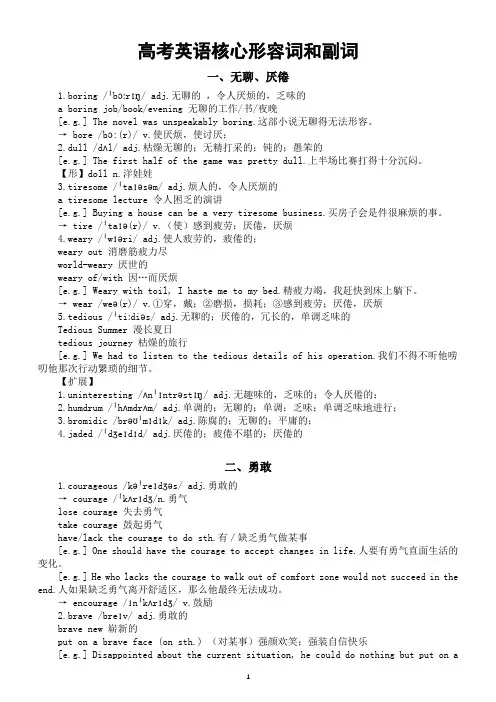
高考英语核心形容词和副词一、无聊、厌倦1.boring /ˈbɔːrɪŋ/ adj.无聊的,令人厌烦的,乏味的a boring job/book/evening 无聊的工作/书/夜晚[e.g.] The novel was unspeakably boring.这部小说无聊得无法形容。
→ bore /bɔ:(r)/ v.使厌烦,使讨厌;2.dull /dʌl/ adj.枯燥无聊的;无精打采的;钝的;愚笨的[e.g.] The first half of the game was pretty dull.上半场比赛打得十分沉闷。
【形】doll n.洋娃娃3.tiresome /ˈtaɪəsəm/ adj.烦人的,令人厌烦的a tiresome lecture 令人困乏的演讲[e.g.] Buying a house can be a very tiresome business.买房子会是件很麻烦的事。
→ tire /ˈtaɪə(r)/ v.(使)感到疲劳;厌倦,厌烦4.weary /ˈwɪəri/ adj.使人疲劳的,疲倦的;weary out 消磨筋疲力尽world-weary 厌世的weary of/with 因…而厌烦[e.g.] Weary with toil, I haste me to my bed.精疲力竭,我赶快到床上躺下。
→ wear /weə(r)/ v.①穿,戴;②磨损,损耗;③感到疲劳;厌倦,厌烦5.tedious /ˈtiːdiəs/ adj.无聊的;厌倦的,冗长的,单调乏味的Tedious Summer 漫长夏日tedious journey 枯燥的旅行[e.g.] We had to listen to the tedious details of his operation.我们不得不听他唠叨他那次行动繁琐的细节。
【扩展】1.uninteresting /ʌnˈɪntrəstɪŋ/ adj.无趣味的,乏味的;令人厌倦的;2.humdrum /ˈhʌmdrʌm/ adj.单调的;无聊的;单调;乏味;单调乏味地进行;3.bromidic /brəʊˈmɪdɪk/ adj.陈腐的;无聊的;平庸的;4.jaded /ˈdʒeɪdɪd/ adj.厌倦的;疲倦不堪的;厌倦的二、勇敢1.courageous /kəˈreɪdʒəs/ adj.勇敢的→ courage /ˈkʌrɪdʒ/n.勇气lose courage 失去勇气take courage 鼓起勇气have/lack the courage to do sth.有/缺乏勇气做某事[e.g.] One should have the courage to accept changes in life.人要有勇气直面生活的变化。
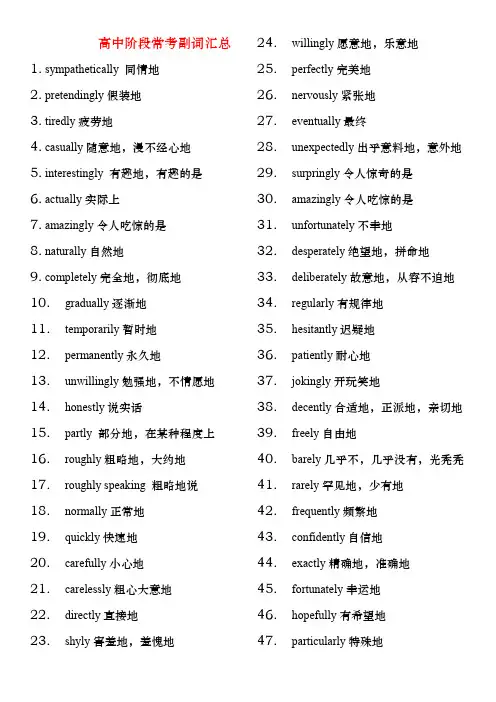
高中阶段常考副词汇总1.sympathetically 同情地2.pretendingly假装地3.tiredly疲劳地4.casually随意地,漫不经心地5.interestingly 有趣地,有趣的是6.actually实际上7.amazingly令人吃惊的是8.naturally自然地pletely完全地,彻底地10.gradually逐渐地11.temporarily暂时地12.permanently永久地13.unwillingly勉强地,不情愿地14.honestly说实话15.partly 部分地,在某种程度上16.roughly粗略地,大约地17.roughly speaking 粗略地说18.normally正常地19.quickly快速地20.carefully小心地21.carelessly粗心大意地22.directly直接地23.shyly害羞地,羞愧地24.willingly愿意地,乐意地25.perfectly完美地26.nervously紧张地27.eventually最终28.unexpectedly出乎意料地,意外地29.surpringly令人惊奇的是30.amazingly令人吃惊的是31.unfortunately不幸地32.desperately绝望地,拼命地33.deliberately故意地,从容不迫地34.regularly有规律地35.hesitantly迟疑地36.patiently耐心地37.jokingly开玩笑地38.decently合适地,正派地,亲切地39.freely自由地40.barely几乎不,几乎没有,光秃秃41.rarely罕见地,少有地42.frequently频繁地43.confidently自信地44.exactly精确地,准确地45.fortunately幸运地46.hopefully有希望地47.particularly特殊地48.literally字面上地49.literally speaking 从字面上来说50.intentionally故意地,有意地51.typically典型地,有代表性地52.annoyingly令人不快地53.painfully非常;痛苦地54.meaningfully有意义地,有目的地55.eagerly急切地56.hurriedly匆忙地,仓促地57.immediately立刻,马上58.regularly有规律地,频繁地59.positively绝对地,乐观地60.virtually事实上;虚拟地61.constantly经常地,不断地62.basically基本上,大体上,总的来说63.deeply深深地64.toughly固执地,强硬地65.sharply严厉地,尖锐地66.certainly无疑地67.obviously显然地68.thankfully感谢地,感激地69.randomly随机地,任意地70.repeatedly重复地,再三地71.sadly悲伤地72.firmly坚定地73.politely有礼貌地74.slightly轻微地75.surely无疑地,肯定地76.finally最后77.occasionally偶尔,偶然78.guiltily内疚地,有罪地79.consequently因此,结果80.traditionally传统地81.originally原本地,最初地82.historically历史上地,从历史观点来说83.practically实事求是地,真实地84.excitedly高兴地85.anxiously焦虑地86.especially尤其是87.necessarily必要地88.clearly清晰地,清楚地89.never从不,绝不90.seldom很少91.definitely肯定地,明确地92.quite十分,非常93.quietly安静地94.simply简单地95.normally正常地96.closely仔细地,严密地97.privately私下地,秘密地98.correctly正确地99.frequently经常地,频繁地100.hastily匆忙地,慌忙地101.angrily愤怒地102.disappointedly失望地103.accidentally意外地,偶然地104.luckily幸运的是105.cheerfully高高兴兴地106.immediately立刻,马上107.secretly秘密地108.temporarily暂时地,临时地109.approximately大约,大概110.wholly完全地,全面地111.exactly准确地,精确地112.strangely奇怪的是113.regrettably遗憾地,抱歉地114.regretfully遗憾地,懊悔地115.suddenly突然116.clearly清楚地,清晰地,显然地117.cleanly干净地,清晰地pletely完全地,彻底地119.extremely极其120.apparently显然地121.generally整体上,大体上122.happily快乐地,幸福地123.sincerely真诚地124.calmly冷静地125.increasingly越来越多地,不断增加地126.interestingly有趣地127.previously以前地,先前地128.delightfully欣然地,快乐地129.pitifully可怜地,令人怜悯地130.separately单独地,分别地131.similarly相似地132.purposely故意地,蓄意地133.sadly悲伤地134.fiercely凶猛地,猛烈地135.tightly紧紧地,牢牢地136.proudly自豪地。

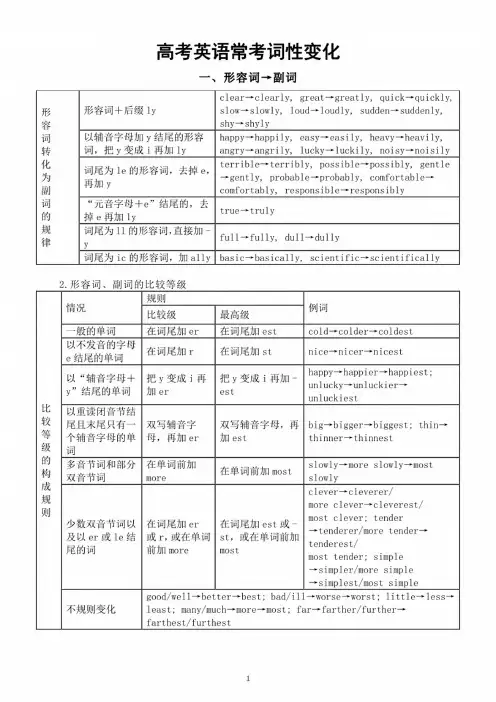
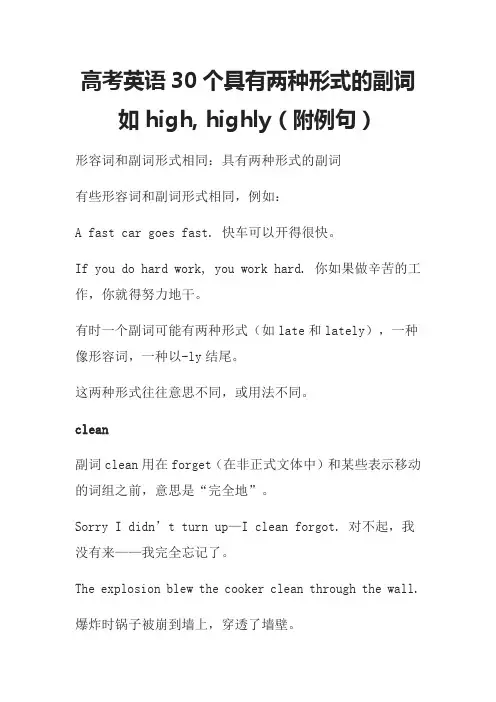
高考英语30个具有两种形式的副词如high, highly(附例句)形容词和副词形式相同:具有两种形式的副词有些形容词和副词形式相同,例如:A fast car goes fast. 快车可以开得很快。
If you do hard work, you work hard. 你如果做辛苦的工作,你就得努力地干。
有时一个副词可能有两种形式(如late和lately),一种像形容词,一种以-ly结尾。
这两种形式往往意思不同,或用法不同。
clean副词clean用在forget(在非正式文体中)和某些表示移动的词组之前,意思是“完全地”。
Sorry I didn’t turn up—I clean forgot. 对不起,我没有来——我完全忘记了。
The explosion blew the cooker clean through the wall. 爆炸时锅子被崩到墙上,穿透了墙壁。
dead在某些词组里,副词dead的意思是“的确”、“完全”或“非常”。
例如:dead ahead, dead certain, dead drunk, dead right, dead slow, dead straight, dead sure, dead tired。
请注意:deadly是形容词,意思是“致命的”。
表达这个意思的副词时fatally。
试比较:Cyanide is a deadly poison. 氰化物是一种致命的毒药。
She was fatally injured in the crash. 她在车锅中受了致命的重伤。
directdirect在非正式文体中常用作副词。
The plane goes direct from London to Houston without stopping.飞机由伦敦直飞休斯顿,中途不停。
50% cheaper—order direct from the factory! 便宜50%——直接从工厂订货吧!easyeasy在某些非正式的词组里用作副词。
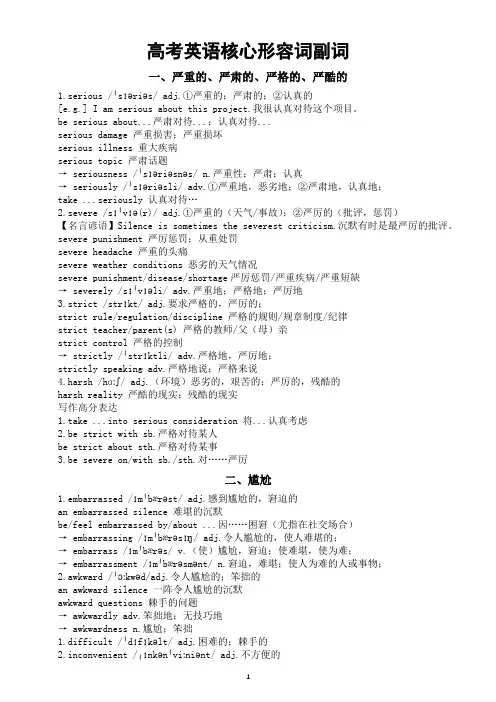
高考英语核心形容词副词一、严重的、严肃的、严格的、严酷的1.serious /ˈsɪəriəs/ adj.①严重的;严肃的;②认真的[e.g.] I am serious about this project.我很认真对待这个项目。
be serious about...严肃对待...;认真对待...serious damage 严重损害;严重损坏serious illness 重大疾病serious topic 严肃话题→ seriousness /ˈsɪəriəsnəs/ n.严重性;严肃;认真→ seriously /ˈsɪəriəsli/ adv.①严重地,恶劣地;②严肃地,认真地;take ...seriously 认真对待…2.severe /sɪˈvɪə(r)/ adj.①严重的(天气/事故);②严厉的(批评,惩罚)【名言谚语】Silence is sometimes the severest criticism.沉默有时是最严厉的批评。
severe punishment 严厉惩罚;从重处罚severe headache 严重的头痛severe weather conditions 恶劣的天气情况severe punishment/disease/shortage严厉惩罚/严重疾病/严重短缺→ severely /sɪˈvɪəli/ adv.严重地;严格地;严厉地3.strict /strɪkt/ adj.要求严格的,严厉的;strict rule/regulation/discipline 严格的规则/规章制度/纪律strict teacher/parent(s) 严格的教师/父(母)亲strict control 严格的控制→ strictly /ˈstrɪktli/ adv.严格地,严厉地;strictly speaking adv.严格地说;严格来说4.harsh /hɑːʃ/ adj.(环境)恶劣的,艰苦的;严厉的,残酷的harsh reality 严酷的现实;残酷的现实写作高分表达1.take ...into serious consideration 将...认真考虑2.be strict with sb.严格对待某人be strict about sth.严格对待某事3.be severe on/with sb./sth.对……严厉二、尴尬1.embarrassed /ɪmˈbærəst/ adj.感到尴尬的,窘迫的an embarrassed silence 难堪的沉默be/feel embarrassed by/about ...因……困窘(尤指在社交场合)→ embarrassing /ɪmˈbærəsɪŋ/ adj.令人尴尬的,使人难堪的;→ embarrass /ɪmˈbærəs/ v.(使)尴尬,窘迫;使难堪,使为难;→ embarrassment /ɪmˈbærəsmənt/ n.窘迫,难堪;使人为难的人或事物;2.awkward /ˈɔːkwəd/adj.令人尴尬的;笨拙的an awkward silence 一阵令人尴尬的沉默awkward questions 棘手的问题→ awkwardly adv.笨拙地;无技巧地→ awkwardness n.尴尬;笨拙1.difficult /ˈdɪfɪkəlt/ adj.困难的;棘手的2.inconvenient /ˌɪnkənˈviːniənt/ adj.不方便的3.clumsy /ˈklʌmzi/ adj.笨拙的4.ashamed /əˈʃeɪmd/ adj.尴尬的;羞愧的;羞耻的尴尬”的反义词fortable /ˈkʌmftəb(ə)l/ adj.舒适的2.convenient /kənˈviːniənt/ adj.方便的3.handy /ˈhændi/adj.便利的;灵巧的三、好奇1.curious /ˈkjʊəriəs/ adj.好奇的be curious about 对……感到好奇[e.g.]She was curious about the news.她对这个新闻感到好奇。
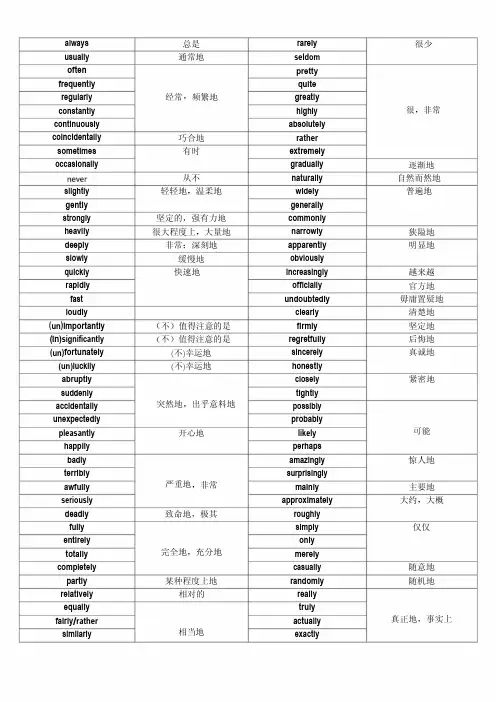
总是很少always rarely通常地usually seldomoften prettyfrequently quite经常,频繁地regularly greatly很,非常constantly highlycontinuously absolutely巧合地coincidentally rather有时sometimes extremelyoccasionally gradually逐渐地从不自然而然地naturally轻轻地,温柔地普遍地slightly widelygently generally坚定的,强有力地strongly commonly很大程度上,大量地狭隘地heavily narrowly非常;深刻地明显地deeply apparently缓慢地slowly obviously快速地越来越quickly increasinglyrapidly officially官方地毋庸置疑地fast undoubtedly清楚地clearlyloudly(un)importantly firmly(不)值得注意的是坚定地(in)significantly regretfully(不)值得注意的是后悔地(un)fortunately sincerely(不)幸运地真诚地(un)luckily honestly(不)幸运地紧密地abruptly closelysuddenly tightly突然地,出乎意料地accidentally possiblyunexpectedlyprobably可能pleasantly likely开心地happily perhaps惊人地badly amazinglyterribly surprisingly严重地,非常主要地awfully mainlyseriously approximately大约,大概deadly roughly致命地,极其仅仅fully simplyentirely only完全地,充分地totally merely随意地completely casuallypartly randomly某种程度上地随机地relatively really相对的equally truly真正地,事实上fairly/rather actually相当地similarly exactly尴尬地likewise with embarrassment with confidence 自信地激动地confidently excitedly 严肃地,认真地with patience 耐心地seriously patiently firmly 坚定地eagerly with determination in eagerness 困惑地with pride 骄傲地in confusion proudly 肯定地,当然令某人惊讶的是definitely。
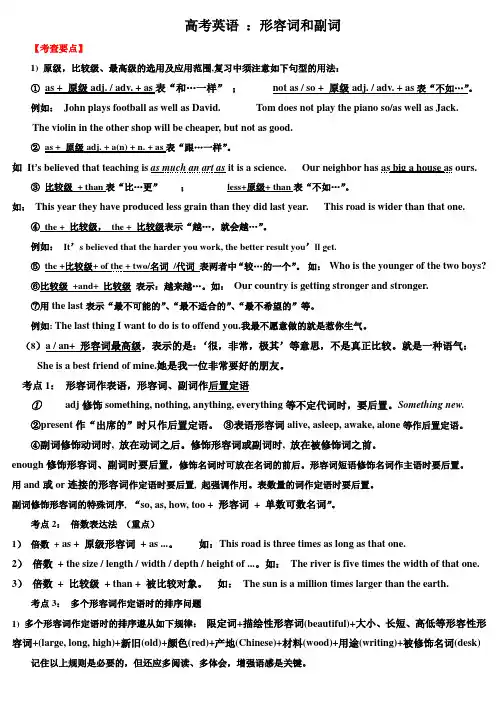
高考英语:形容词和副词【考查要点】1) 原级,比较级、最高级的选用及应用范围,复习中须注意如下句型的用法:①as + 原级adj. / adv. + as表“和…一样”;not as / so + 原级adj. / adv. + as表“不如…”。
例如:John plays football as well as David. Tom does not play the piano so/as well as Jack.The violin in the other shop will be cheaper, but not as good.②as + 原级adj. + a(n) + n. + as表“跟…一样”。
如It’s believed that teaching is as much an art as it is a science. Our neighbor has as big a house as ours.③比较级+ than表“比…更”;less+原级+ than表“不如…”。
如:This year they have produced less grain than they did last year. This road is wider than that one.④the + 比较级,the + 比较级表示“越…,就会越…”。
例如:It’s believed that the harder you work, the better result you’ll get.⑤the +比较级+ of the + two/名词/代词表两者中“较…的一个”。
如:Who is the younger of the two boys?⑥比较级+and+ 比较级表示:越来越…。
如:Our country is getting stronger and stronger.⑦用the last表示“最不可能的”、“最不适合的”、“最不希望的”等。

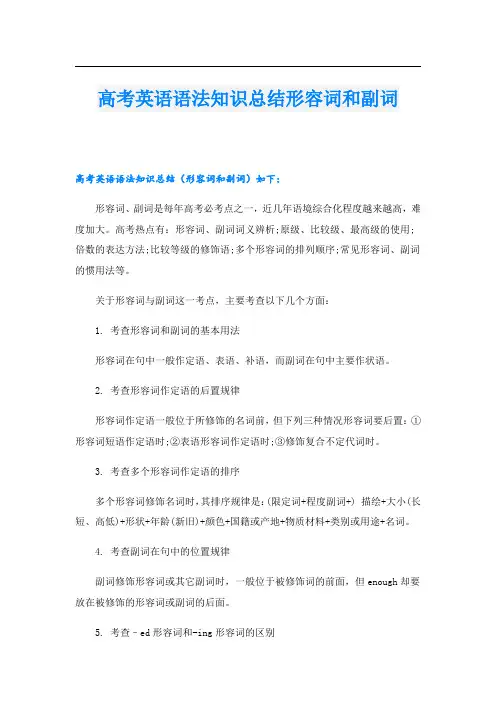
高考英语语法知识总结形容词和副词高考英语语法知识总结(形容词和副词)如下:形容词、副词是每年高考必考点之一,近几年语境综合化程度越来越高,难度加大。
高考热点有:形容词、副词词义辨析;原级、比较级、最高级的使用;倍数的表达方法;比较等级的修饰语;多个形容词的排列顺序;常见形容词、副词的惯用法等。
关于形容词与副词这一考点,主要考查以下几个方面:1. 考查形容词和副词的基本用法形容词在句中一般作定语、表语、补语,而副词在句中主要作状语。
2. 考查形容词作定语的后置规律形容词作定语一般位于所修饰的名词前,但下列三种情况形容词要后置:①形容词短语作定语时;②表语形容词作定语时;③修饰复合不定代词时。
3. 考查多个形容词作定语的排序多个形容词修饰名词时,其排序规律是:(限定词+程度副词+) 描绘+大小(长短、高低)+形状+年龄(新旧)+颜色+国籍或产地+物质材料+类别或用途+名词。
4. 考查副词在句中的位置规律副词修饰形容词或其它副词时,一般位于被修饰词的前面,但enough却要放在被修饰的形容词或副词的后面。
5. 考查–ed形容词和-ing形容词的区别-ed形容词,通常说明人,意为“(某人)感到……”;-ing形容词通常说明事物,意为“(某事物)令人……”或“令人……的(事物)”。
6. 考查两种不同形式的副词的用法差异即考查与形容词同形的副词与形容词后加ly构成的副词的区别。
7. 考查形容词和副词的比较等级。
8. 考查比较等级的修饰语。
考点1:在具体的语境中辨析形容词与副词的语义从复现的频率来看,此点是高考对形容词、副词考查的第一大热点。
解答此类题关键是要分析具体的语境,结合基本词义、搭配等来选择正确的答案。
经过统计,常见常考的形容词和副词有(按频度排列):even; interested; interesting; yet; hardly; just; therefore; though; too; very; common; effective; either; ever; fair; however; less; more; nearly; only; purposefully; rather; still; such; surprised; surprising 还有以下形容词和副词应当熟悉和掌握: a good many; a number of; acceptable; accidentally; actively; adequately; already; another; anxious; anyway; ashamed; attentively; bad; badly; besides; better; but; careful; changeable; cheap; comfortable; convenient; eagerly; easy; encouraging; enha-ncing; equal; even though; eventually; fairly; far; fewer; following; formally; friendly; gen-erously; gradually; heavily; historic; hopefully; immediately; inaccessible; individual; inevit-able; initial; instead; invisible; largely; never; next; no; normal; nowadays; obviously; ordin-ary; other; otherwise; patient; plenty of; prac-tical; promoting; proper; quickly; readily; reasonable; remote; seldom; seriously; short; so; stimulating; traditional; unavailable; unav-oidable; unfavorable; unfortunately; usual; va-rious; weak; well考点2:考查形容词、副词的比较级、最高级及前面的修饰语【备考清单】1) 比较级、最高级的选用及应用范围比较级、最高级常用于表示两者或多者间的比较。
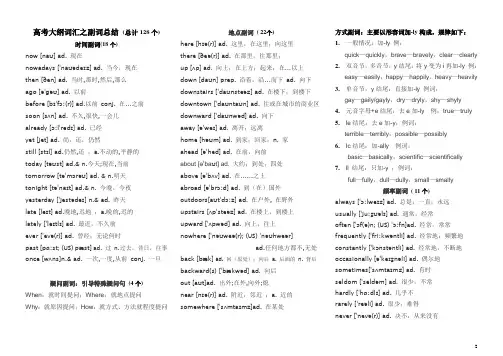
高考大纲词汇之副词总结(总计128个)时间副词(18个)now [naʊ] ad. 现在nowadays [ˈnaʊədeɪz] ad. 当今,现在then [ðen] ad. 当时,那时,然后,那么ago [əˈɡəʊ] ad. 以前before [bɪˈfɔː(r)] ad.以前conj. 在…之前soon [sʌn] ad. 不久,很快,一会儿already [ɔːlˈredɪ] ad. 已经yet [jet] ad. 尚,还,仍然still [stɪl] ad.仍然,还;a.不动的,平静的today [təʊst] ad.& n.今天;现在,当前tomorrow [təˈmɔrəʊ] ad. & n.明天tonight [təˈnaɪt] ad.& n. 今晚,今夜yesterday [ˈjestədeɪ] n.& ad. 昨天late [leɪt] ad.晚地,迟地;a.晚的,迟的lately [ˈleɪtlɪ] ad. 最近,不久前ever [ˈevə(r)] ad. 曾经;无论何时past [pɑːst; (US) pæst]ad. 过n.过去,昔日,往事once [wʌns]n.& ad. 一次,一度,从前conj. 一旦疑问副词:引导特殊疑问句(4个) When:就时间提问;Where:就地点提问Why:就原因提问;How:就方式、方法就程度提问地点副词( 22个)here [hɪə(r)] ad. 这里,在这里;向这里there [ðeə(r)] ad. 在那里,往那里;up [ʌp] ad. 向上;在上方;起来;在…以上down [daʊn] prep. 沿着,沿…而下ad. 向下downstairs [ˈdaʊnsteəz] ad. 在楼下;到楼下downtown [ˈdaʊntaʊn] ad. 往或在城市的商业区downward [ˈdaʊnwəd] ad. 向下away [əˈweɪ] ad. 离开;远离home [həʊm] ad. 到家;回家;n. 家ahead [əˈhed] ad. 在前,向前about [əˈbaʊt] ad. 大约;到处;四处above [əˈbʌv] ad. 在……之上abroad [əˈbrɔːd] ad. 到(在)国外outdoors[aʊtˈdɔːz] ad. 在户外, 在野外upstairs [ʌpˈsteəz] ad. 在楼上,到楼上upward [ˈʌpwəd] ad. 向上;往上nowhere [ˈnəʊweə(r); (US) ˈnəʊhweər]ad.任何地方都不,无处back [bæk] ad. 回(原处);向后a. 后面的n. 背后backward(s) [ˈbækwəd] ad. 向后out [aʊt]ad. 出外;在外,向外;熄near [nɪə(r)] ad. 附近,邻近;a. 近的somewhere [ˈsʌmtaɪmz]ad. 在某处方式副词:主要以形容词加-ly构成,规律如下:1.一般情况:加-ly 例:quick—quickly,brave—bravely,clear—clearly2.双音节,多音节,y结尾:将y变为i再加-ly 例:easy—easily,happy—happily,heavy—heavily3.单音节,y结尾:直接加-ly 例词:gay—gaily/gayly,dry—dryly,shy—shyly4.元音字母+e结尾:去e加-ly 例:true—truly5.le结尾:去e加-y;例词:terrible—terribly,possible—possibly6.Ic结尾:加-ally 例词:basic—basically,scientific—scientifically7.ll 结尾:只加-y ;例词:full—fully,dull—dully,small—smally频率副词( 11个)always [ˈɔːlweɪz] ad. 总是;一直;永远usually [ˈjuːʒʊəlɪ] ad. 通常,经常often [ˈɔf(ə)n; (US) ˈɔːfn]ad. 经常,常常frequently [ˈfriːkwəntli] ad. 经常地;频繁地constantly [ˈkɔnstəntli] ad. 经常地,不断地occasionally [ə'keɪʒnəli] ad.偶尔地sometimes[ˈsʌmtaɪmz] ad. 有时seldom [ˈseldəm] ad. 很少,不常hardly [ˈhɑːdlɪ] ad. 几乎不rarely [ˈreəli] ad. 很少;难得never [ˈnevə(r)] ad. 决不,从来没有程度副词( 22个)fairly [ˈfeəlɪ] ad. 公正地,正当地;相当(程度)地pretty [ˈprɪtɪ] ad.相当地;a. 漂亮的,俊俏的rather [ˈrɑːðə; (US) ˈræðər] ad. 相当,宁可quite [kwaɪt] ad. 完全,十分very [ˈverɪ] vad. 很,非常much (more,most) [mʌtʃ] ad. 非常;更加too [təˈnaɪt] ad.也,还,又,太,过分,很,非常greatly [ˈɡreɪt li] ad. 很;非常;大大地almost [ˈɔːlməʊst] ad. 几乎,差不多nearly [ˈnɪəlɪ] ad. 将近,几乎half [hɑːf] ad.一半地;不完全地;a.& n. 半,一半,半个high [haɪ] ad. 高地(表具体);a. 高的;高度的highly [ˈhaɪli] ad.高度地(抽象);很;非常;赞许地deep [diːp]ad. 深深地(具体);a. 深的;深刻的;深奥的deeply [ˈdiːplɪ] ad. 深深地(抽象);强烈地;(颜色)浓浓地partly [ˈpɑːtlɪ] ad.部分地,在一定程度上perfectly ['pɜːfɪktli]ad.完全地;无瑕疵地;完整地;完美地;really v [ˈrɪəlɪ] ad. 真正地;到底;确实even [ˈiːv(ə)n] ad. 甚至,连(…都);更altogether [ɔːltəˈɡeðə(r)]ad. 总共;完全;总的来说through [θruː] ad.穿(通)过;自始至终,全部throughout [θruːˈaʊt] ad. 自始至终关系副词( 3个)When:=on which代替先行词在从句中做时间状语Where:=in which代替先行词在从句中做地点状语Why:= for chich代替先行词在从句中做原因状语焦点副词( 12个)only [ˈəʊnlɪ] ad. 仅仅,只,才;a.惟一的,仅有的alone [əˈləʊn] ad.独自地;仅仅a. 单独的,孤独的also [ˈɔːlsəʊ] ad. 也even [ˈiːv(ə)n] ad. 甚至,连(…都);更just [dʒʌst] ad. 刚才;恰好;不过;仅a. 公正的merely [ˈmɪəlɪ] ad. 仅仅,只不过simply [ˈsɪmplɪ] ad.简单地,(加强语气)的确mainly [ˈmeɪnli] ad. 主要地;大部分地especially [ɪˈspeʃəlɪ] ad. 特别,尤其exactly [ ɪɡ'zæktli ] ad. 精确地;确切地too [təˈnaɪt] ad.也,还,又,太,过分,很,非常as well [æz wel] ad.也;又连接副词:(相当与并列连词) ( 13个)therefore [ˈðeəfɔː(r)] ad. 因此,所以besides [bɪˈsaɪdz] ad. 还有,此外otherwise[ˈʌðəwaɪz] ad.要不然,否则,另样however [haʊ'evə(r)] ad. 然而;无论如何;不管多么moreover[mɔːr'əʊvə(r)] ad.此外;而且furthermore[ˌfɜːðə'mɔː(r)] ad. 而且;此外still [stɪl] ad.仍然,还;a.不动的,平静的thus [ðʌs] ad. 这样;因而meanwhile [ˈmiːnwaɪl; (US) ˈmɪnhwaɪl] ad.同时引导名词性从句或不定式的副词When;why;where;how句子副词:(常用来修饰整个句子的副词)( 12个)frankly['fræŋkli] ad. 坦白地;坦率地honestly [ˈɔnɪstli] ad. 诚实地;老实地;的确clearly [ˈklɪəlɪ] ad. 清楚地,无疑地obviously [ˈɔbvɪəsli] ad. 显然地evidently [ˈevɪdəntli] ad. 显然地generally [ˈdʒenrəli] ad. 一般地;通常;普遍地briefly [ˈbriːf li] ad. 简短地fortunately [ˈfɔːtʃənətli] ad. 幸运地;幸亏luckily [ˈlʌkɪli] ad. 幸运地;幸亏地unexpectedly[ˌʌnɪk'spektɪdli] ad.未料到地;意外地naturally [ˈnætʃrəli] ad. 自然地;天生地hopefully [ˈhəʊpfʊli] ad.怀着希望地;但愿其他副词( 11 个)again [əˈɡeɪn] ad. 再一次;再,又alike [əˈlaɪk] ad. 很相似地,同样地else [els] ad. 别的,其他的instead [ɪnˈsted] ad. 代替,顶替maybe [ˈmeɪbiː] ad. 可能,大概,也许perhaps [pəˈhæps] ad. 可能,或not [nɔt] ad. 不,没no [nəʊ] ad. 不,不是a.没有,无,不OK[əʊˈkeɪ] ad. (口语)好,对,不错yes [jes] ad. 是,好,同意twice [twaɪs] ad. 两次;两倍。
高考英语总复习副词的种类及用法在句中修饰行为或状态特征的词称为副词。
副词的种类根据副词与句子的关系,英语中的副词可分为adjunct(附属)、disjunct(分离)、conjunct(连接)三类副词。
adjunct(位于句子内部的副词)时间副词:例1:He went home yesterday(他昨天回家了,yesterday修饰went)例2:I have just finished my homework.(我刚完成我的家庭作业)频率副词:例1:Do you often read English books?(你经常读英语书吗?)例2:I have never read such books.(我从没读过这样的书。
)地点副词:例1:He will study abroad next year(明年他将在国外学习)例2: He came in(他进来)方式副词:例1:Jack drives very carefully.(杰克开车很小心)例2:She slowly opened the present. (她慢慢地打开礼物)程度副词:例1:I am deeply grateful to you(我由衷地感激你)例2:I quite agree with your opinion(我相当同意你的观点)疑问副词:how,when,where,why例:How often do you see a movie(你多久看一次电影)关系副词:when,where,why例:This is(the place)where he was born.(这是他出生的地方)conjunct(连接两个句子的副词)连接副词:therefore(因此),moreover(此外),however,otherwise(另外的),then,when ,where,how,why……例1:We must be early; otherwise we won't get a seat(我们得早点走,否则我们就没有座位了)例2:Bicycling is good exercise; moreover, it won't pollute the air.(骑自行车是个很好的运动,此外它还不污染环境)disjunct(与句子分离的副词)句子副词(修饰整个句子):actually,certainly,clearly,definitely,evidently(明显地),fortunately,frankly,honestly,possibly,undoubtedly(的确地),unexpectedly(未料到地),finally 等undoubtedly,he is an expert in this field.(毫无疑问,他是这个领域的专家)frankly, you are wrong.(坦白说你错了)副词的位置一般原则:遇有be 动词或助动词时,副词均置于该be动词或助动词之后例1:He is always kind.例2:He can hardly walk(他几乎走不动了)1. 频率副词,置于一般行为动词之前He has never been late. 他从未迟到过。
高考英语语法精讲十副词高考英语语法精讲十副词高考英语语法精讲十副词1、程度副词 (quite, rather, fairly)quite: 不修饰比较级,但: He is quite better.表示程度,和可显示程度的词连用,如:old, interesting, polite, tired, etc.类似completely(完全地)和absolutely(绝对地),和下列词连用,如:perfect, impossible, different, etc.此时,可修饰adj., adv., v.,等.The job is quite impossible.That’s not quite what I want.rather: 可与比较级及too 连用rather older, rather too many peoplerather than表示选择,宁愿(前面)不愿(后面)I’d prefer to go in August rather than in July.I decided to write rather than (to) telephone.or rather 表示更确切地说I’ll meet him, or rather, I’ll ask him to meet me.fairly:不可与比较级连用,与积极意义的`词连用强弱程度的顺序:very → rather → quite → fairly → notThis film is very good. (rather good 胜过多数影片;quite good 值得一看; fairly good 勉强还可以看看)2、频度副词(often, usually, always, ever, never, seldom, hardly 等放在行为动词前、系动词及助动词后He is always making a joke.never, hardly, seldom等放在句首时,用倒装Never have I seen anything so wonderful as that.简答中频度副词放在助动词及系动词前---He is late again. ---Yes, he always is.3、too much much tootoo much① +不可数名词,意思太多I drank (far much, a lot , a little, rather) too much beer last night.②作 adv.You work too much.③作 pro.Too much was happening all at once.much too + adj. 实在太You are much too kind to me.4、形近词① deep / deeply deep into the night (the woods, the future)be deeply moved (hurt, sorry) deeply regret② late / lately / later / latest arrive (come) lateWhat have you been doing lately ?③ near / nearly go (come, live) near nearly finished (midnight)④ loud / loudly / aloud--adj. --adv.an early train a fast driver hard work a deep hole arrive early drive fast work hard drink deep。
高考英语作文常用的90个高级副词有中文版(小说)高考英语作文常用的90个高级副词有中文版(小说)在高考英语作文中,使用高级副词能够使文章的语言更加丰富多样。
下面是常用的90个高级副词及其中文版,供参考:1. Accordingly - 相应地2. Accidentally - 偶然地3. Actively - 积极地4. Actually - 实际上5. Admittedly - 公认地6. Allegedly - 据称7. Alternatively - 或者8. Amazingly - 令人惊讶地9. Appropriately - 适当地10. Arguably - 可以说是11. Apparently - 显然地12. Approximately - 大约13. Bitterly - 苦涩地14. Briskly - 活泼地15. Carelessly - 粗心地16. Cautiously - 谨慎地17. Clearly - 明显地20. Consequently - 因此21. Consistently - 一贯地22. Constantly - 不断地23. Conveniently -方便地24. Coolly - 冷静地25. Crazily - 疯狂地26. Curiously - 好奇地27. Decisively - 果断地28. Definitely - 绝对地29. Deliberately - 故意地30. Desperately - 绝望地31. Differently - 不同地32. Dimly - 模糊地33. Distinctly - 清晰地34. Doubtfully - 怀疑地35. Dramatically - 戏剧性地36. Effectively - 有效地37. Evidently - 明显地38. Exclusively - 专门地39. Extensively - 广泛地40. Famously - 著名地41. ally - 极好地42. Finally - 最后43. Firstly - 首先44. Foolishly - 愚蠢地45. Fortunately - 幸运地46. Frequently - 频繁地47. Generously - 慷慨地48. Genuinely - 真诚地49. Gradually - 逐渐地50. Happily - 快乐地51. Hopefully - 希望地52. Immediately - 立即53. Impartially - 公正地54. Importantly - 重要地55. Inevitably - 必然地56. Intensely - 强烈地57. Incredibly - 难以置信地58. Interestingly - 有趣地59. Ironically - 讽刺地60. Joyfully - 快乐地61. Justly - 公正地62. Keenly - 敏锐地63. Largely - 主要地64. Logically - 逻辑地65. Meanwhile - 同时66. Merely - 仅仅67. Naturally - 自然地68. Needless to say - 不用说69. Obviously - 显然地70. Occasionally - 有时候71. Particularly - 特别地72. Pleasantly - 愉快地73. Possibly - 可能地74. Precisely - 精确地75. Previously - 以前76. Probably - 可能地77. Promptly - 迅速地78. Quickly - 快速地79. Rarely - 很少地80. Repeatedly - 反复地81. Rigidly - 严格地82. Roughly - 大致地83. Sadly - 悲伤地84. Severely - 严重地85. Sharply - 急剧地86. Similarly - 类似地87. Sincerely - 真诚地88. Slightly - 稍微地89. Steadily - 稳定地90. Suddenly - 突然地以上是高考英语作文常用的90个高级副词及其中文版,希望对你有帮助。
(完整版)英语程度副词一、程度副词的特点程度副词用于表示程度,常见的有fairly, pretty, rather, quite, very, much, too, greatly, almost, nearly, half, highly, awfully, deeply, partly, perfectly, really 等。
二、程度副词的用法注意点(1)exactly程度副词主要用于修饰形容词和副词,有的还可修饰比较级(如much, rather 等)和最高级(如quite, much, almost 等)。
如:This is quite [much] the most expensive radio here. 这是这里最贵的收音机。
【说明】quite 有时也修饰比较级,但只用于quite better(身体康复)这一表达。
(2) 有的程度副词(如quite, rather, almost等)可修饰动词,但有的(如fairly, pretty, very等fairly, pretty, 则不能修饰动词。
如:I quite agree with you. 我完全同意你的意见。
(不用fairly, pretty, very)We rather like the film. 我们很喜欢这部电影。
(不用fairly, pretty, very)(3) 个别的程度副词(主要是quite和rather)还可修饰名词(注意词序)。
如:It’s quite [rather] a good idea. / It’s a quite [rather] good idea. 那可真是个好主意。
若此结构中没有形容词,则quite 和rather 则只能放在冠词之前。
如:It was quite [rather] a success. 那事相当成功。
所有的英语程度副词:much, little, very, rather, so, too, quite, perfectly, enough, extremely, entirely, almost, slightly, fairly, a lot/bit/little, far, by far, even, nearly, pretty, as, this/that(=so), fully, absolutely ,barely, completely, hardly, just, only, really, scarcely中学英语中的“非常”程度副词系列1.very修饰原级形容词和副词以及完全形容词性化的现在分词或过去分词,如:tired, ashamed, exciting等【注意】1) 非形容词性化的分词不能用very修饰, 可用much修饰.例:She is very pleased by his words. (×)She is much pleased by his words. (√)2) 一些不分等级的形容词不能用very修饰, 可用quite (completely) 修饰.例:You are very wrong. (×)You are quite wrong. (√)3) 部分以a 开头的形容词不能用very修饰, 可用 much修饰.例:She was very afraid of dogs. (×)She was much afraid of dogs. (√)2. much1) 修饰动词;2) 修饰介词以及形容词和副词的比较级;例:a) The girl is much like her mother. 这女孩非常像她妈妈。
高考英语核心形容词副词一、公平1.fair /feə(r)/ adj.公平的it is fair to say that…可以说……[e.g.] It is fair to say that the Internet has changed people's life dramatically.议论文—互联网可以说互联网极大程度地改变了人们的生活。
→ fairness /ˈfeənəs/ n.公平→ fairly /ˈfeəli/ adv.相当地;公平地;简直→ unfair /ˌʌnˈfeə(r)/ adj.不公平的2.just /dʒʌst/ adj.公正的[e.g.] Be just to all, but trust not all.要公正对待所有人,但不要轻信所有人。
→ justice /ˈdʒʌstɪs/ n.正义→ justly /ˈdʒʌstli/ adv.公正地;正当地→ justify /ˈdʒʌstɪfaɪ/ v.证明合法→ justified /ˈdʒʌstɪfaɪd/ adj.有正当理由的;合乎情理的3.impartial /ɪmˈpɑːʃ(ə)l/ adj.公正的[e.g.] He is an impartial judge.他是位公正的法官。
→ partial /ˈpɑːʃ(ə)l/ adj.不公平的4.unbiased /ʌnˈbaɪəst/ adj.没有偏见的[e.g.] There is no clear and unbiased information available for consumers. 没有清楚公正的信息提供给消费者。
→ bias /ˈbaɪəs/ n.误差5.objective /əbˈdʒektɪv/ adj.客观的(不为个人偏见兴趣、感情或看法所左右)[e.g.] It's hard to give an objective opinion about your close friends. 很难对自己的好朋友作出客观的评价。
高中英语语法专题副词与必背短语英语老师总是说“程度副词”,当时真的似懂非懂的,很朦胧的感觉。
现在想想,许多副词不就是交代程度的吗?,如何学好英语?我在这里整理了相关资料,快来学习学习吧!高中英语语法专题副词一、概念副词(Adverb 简称adv.)是指在句子中表示行为或状态特征的词,用以修饰动词、形容词、副词本身的词。
①副词修饰动词He runs fast. 他跑得很快。
②副词修饰形容词He is very clever. 他很聪慧。
③副词修饰副词I can dance very well. 我跳舞跳得不错。
二、副词分类时间副词(today,ago)、地点副词(here,upstairs)、程度副词(very,so)、方式副词(fast,loudly) 、疑问副词(when,how)、关系副词(when,where 等常用来引导定语从句)、频率副词(often,never). 需要留意副词在句子中的位置,表示地点、时间、方式的副词通常放在句末,而频率副词和程度副词通常放在助动词后,实义动词前,即“助后动前”。
三、形容变副词1. 形容词词尾加ly 例如:loud-loudly slow-slowly2. 形容词以辅音字母加y结尾,去掉y变i加ly 例如:heavy-heavily happy-happily3. 部分形容词以e结尾,去掉e再加ly 例如:whole-wholly true-truly4. 特别变化例如:good-well5. 形容词副词同形例如:late-late hard-hard fast-fast四、副词在句子中的成分1. 副词作状语例如:She studies hard.她学习很用功(hard作方式状语修饰动词study)2. 副词作定语例如:He likes the pictures there. 他喜爱那儿的图画.(there修饰pictures作定语)3. 副词作表语例如:Im home.我到家了。
常见的有fairlyprettyratherquiteverymuchtoogreatlyalmostnearlyhalfhighlyawfullydeeplypartlyperfectlyreally 1.程度副词表示动词形容词或其他副词的程度如:too(太)very(非常)much(很)almost(几
乎)nearly(几乎)enough(充分)hardly(几乎不)等.
2.程度副词用在一般动词前.
I almost forgot to bring my key.
我差点忘记带钥匙.
3.程度副词用在助动词与一般动词之间.
I could hardly believe it.
我几乎不能相信它.
4.程度副词用在形容词或副词前enough除外.
He drives very carefully.
他驾驶很小心.
He is old enough to go to school.
他够年龄可以上学了.
5.程度副词much(…得多)even(更加)可在形容词或副词的比较级之前作修饰语.
This question is much more difficult than that one.
这个问题比那个问题难多了.
Canada is even larger than the United States.
加拿大甚至比美国还大.。